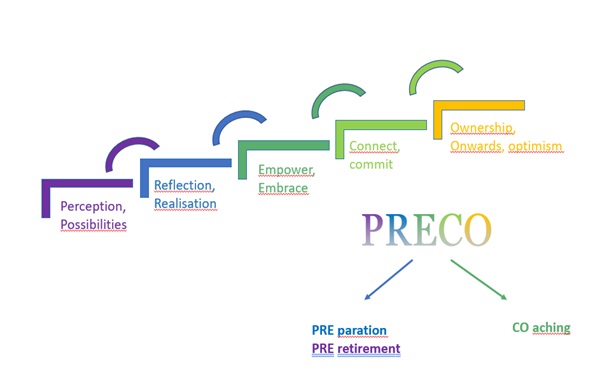A Coaching Model Created by Melanie Brown
(Retirement Preparation Coach, SWITZERLAND)
Introduction
After much reflection, I have decided to link my coaching model to my niche and my research paper: retirement preparation coaching. Consequently, the name of the model PRECO came quite easily to me, and my surprise, the power words that could define the various steps as well.
Retirement preparation coaching sessions are designed for those who are in pre-retirement planning (up to five years before retirement). Retirement preparation coaching goes well beyond financial advice. Financial planning is certainly an important element in planning for the future beyond work. However, as life expectancy increases (At 65, a man can expect to live 25 more years, and a woman 27), we are living longer and staying healthier so it is important to consider how we will ensure fulfillment and happiness in these later years. Retirement is a major life event and can be one of the hardest times a person will face in their life. Retirement is number 10 in the Social Readjustment Rating Scale (SRRS), more commonly known as the Holmes and Rahe Stress Scale. Even for successful people who have built their identity around their profession and career, retirement is a huge adjustment.
Explanation
Retiring to a suddenly slower pace can bring about many self-identity, self-worth, loss-of-meaning, and loss-of-relevance issues to the individual who has been accustomed to working well over 40 hours a week. Preparing for retirement with a coach allows future retirees to understand all options that lay ahead and open their minds to all that retirement has to offer. Retirement coaching helps people, through an introspective process to explore their retirement project and facilitates clients to replace their work identity, allocate their time and resources, stay relevant and connected, as well as mentally and physically active.
In a retirement coaching process, the coach will ask powerful open questions in a constructive and illuminating way to set clients on a path to achieve a fulfilling retirement.
The PRECO model that I propose helps clients realize where they are and understand the journey ahead, as they progress through the various steps during their transformation journey.
The PRECO name comes from the contraction of both PREparation or PREretirement and COaching. I currently work in an organization which employs 46 different nationalities in Switzerland and it was important to me that the name of the model could be easily pronounced in English and French, whilst also applying to other official Swiss languages.
The PRECOmodelcomprises the following steps that help customers understand the various issues that can hold them back, and the unlimited options ahead of them:
Perception, possibilities:
The transition to retirement comes with expectations, myths, and baggage, both for the person considering retirement and for the people around them. How they choose to retire, what they move toward, and what’s expected of them, will depend on their family dynamics and their level of connection to a community outside of work. In effect, when someone begins their transition to retirement, two big changes happen simultaneously: a change in workplace dynamics and a change in personal relationships.
Retirement entails a big shift in identity for most people, and as such, it tends to push hard on the button: “What do I care about?”This transition sends people into a re-evaluation of values, whether conscious or unconscious. Those who are good at self-reflection and comfortable with change will treat retirement as an opportunity to fulfill unmet needs around meaningful work by entering into jobs or volunteer roles that differ from their past experiences.
- How much time do you spend thinking about retirement?
- What are those thoughts about?
- What does “retirement” mean to you? What do you look forward to doing the most in retirement?
Reflection, realization (self-exploration)
This step is an important one, it’s about partnering with the client to understand the myriad of issues that can hold the client back from transitioning into a successful retirement. The client reflects on the journey to date. The client adjusts his current mind-set to match actual expectations. The coach helps the client to identify what is important to them and what the client would like from retirement.
- Who am I without my work?
- How do you currently spend your free time?
- What are the ‘life challenges that I see in my retirement?
- What new interests or ventures would I like to pursue?
- Think of someone who you believe is enjoying a successful retirement. What are they doing?
- How will I find connectedness; friends, volunteer work, part-time work in my retirement?
- Was anything missing from your career? Are there things you wanted to accomplish but never had the chance?
- What’s an ideal amount of social contact for you?
- What ‘lights my fire’ of passion when I get up in the morning?
- What’s important to you now?
- What have you always wanted to do but never had the time?
Empower, embrace: (decision making, defining retirement)
Once the client has a clear understanding of the issues and how they affect them, they can develop a plan that works for them. At this stage, the coach can help the client choose from a whole world of opportunities, identify passions, and a plan for pursuing them. This plan will allow for a meaningful and successful retirement.
This discussion helps the future retiree to think through the timing of his or her decisions. Transitioning to retirement involves a lot of decision-making. Some decisions are short-term, some are interim, and some are long-term. The coach will also allow the client to realize that navigating this transition requires patience and adjustment to the various bumps that may lay ahead.
- How do you handle uncertainty?
- How can you show kindness to yourself during this period of uncertainty and change?
- What kind of support mechanisms do you have?
- Which decisions do you need to make right away, and which can be put into ongoing exploration?
Connect, commit (transition)
In this phase, the coach will help the client to map out a retirement action plan with practical next steps. This plan is a key step on the path to realizing a fulfilling retirement. It helps the client to your client stay focused, grounded, and committed to their plan by providing structure and accountability through change, and the coach can support them in making any necessary adaptations to their plan as things move forward.
The exit strategy may need to be confirmed as well.
- When is the right time to leave my job?
- When do I inform my employer that I am planning to leave?
- Is anything happening to you that you want to talk about?
Ownership, onwards, optimism (future thinking)
In this phase, the future retiree decides which actions to take to move forward. These are a few examples of coaching questions that could be addressed:
- What is opening up for you as you put your transition plan into action?
- How does it feel to be taking these steps?
- Picture yourself 5-10 years from now: Where will you be living?
- What activities will consume your time?
- What will be important to you?
- What will you do now to maintain the momentum?
- How will you know you have been successful?
Retirement has a lot of moving pieces and it’s hard to figure out. People go into it with the best intentions but find they quickly unravel as a wide range of thoughts and feelings surface that are not always fun or easy to talk about, let alone work through. The PRECOmodel allows a client to open their mind to all that retirement has to offer, and hopefully will make their retirement years bright, fun and full of everything important to them.
References
Career Work in Action, Discussions, and Activities for Professionals, Transitioning to retirement, SCHAFFER, Karen and WENS, Juliana, Toronto, CERIC, November 2019
HOLMES, T.H, & RAHE R.H, Life, Change and Stress (i.e. “The Stress Scale”), 1967.
BIRKEN, Emily Guy, The 5 years before you retire, Kindle Edition, 2014.
Retirement Roadmap planning, Ready to retire ?, FISCHER, Wendy S, Amazon Kindle Edition, 2015
ICA Research Paper, Certified Program, BROWN Melanie, April 2020,
URL https://forum.icacoach.com/discussion/146985/research-paper-retirement-preparation-coaching-finding-a-new-identity-beyond-the-workplace

